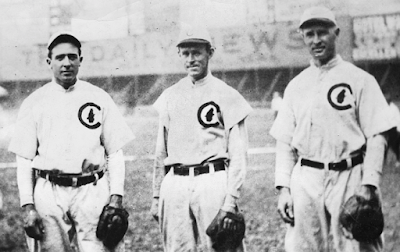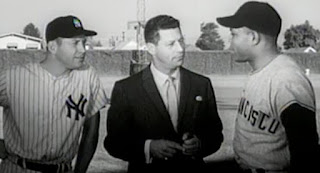Tinker to Evers to Chance
These are the saddest of possible words:"Tinker to Evers to Chance;"
Trio of Bear Cubs and fleeter than birds,
"Tinker to Evers to Chance."
Ruthlessly pricking our gonfalon bubble,
Making the Giants hit into a double-
Words that are heavy with nothing but trouble;
"Tinker to Evers to Chance."
- Franklin P. Adams, New York Mail Newspaper.
On this date in 1910 those words were published for the first time. Shortstop Joe Tinker, second baseman Johnny Evers, and first baseman Frank Chance of the Chicago Cubs have long been considered the best double play trio of their era. However, their notoriety was largely due to the popularity of the poem, written by Franklin P. Adams. When it was originally published it appeared in Adams' weekly "Always in Good Humor" article and was called That Double Play Again, but later became known as Baseball's Sad Lexicon. When Tinker, Evers, and Chance's careers are looked at in detail, both as teammates and individuals, we can see that Mr. Adams significantly enhanced their fan appeal.
Franklin P. Adams was born in Chicago, Illinois in 1881 and lived there until moving to New York City in 1904. His fan allegiance would stay true to the Cubs for the rest of his life even though he was surrounded by Yankees, Dodgers and Giants fans. He wrote for several different New York newspapers over the years between 1904 and 1937. On the day in 1910 that he wrote his poem he was supposedly in a hurry to get out to the baseball game. If true, it must have been the White Sox vs. Yankees game because the Giants and Dodgers were out of town that week. The foreman for the Evening Mail was pressuring him to fill the last eight lines of his column, so he did by quickly writing Baseball's Sad Lexicon. Adams remembers that the day after it was published in the Evening Mail, his editor remarking no matter what else you ever write, you will be known as the guy that wrote those 8 lines. And they weren't much good, at that. Within the week other journalists were capitalizing on its popularity by either writing responding baseball poetry in the same style or adding verses to the original.
 |
| Joe Tinker, Johnny Evers, and Frank Chance |
Mid-season of 1905 Cubs manager Frank Selee left the team due to health issues including pleurisy, rheumatoid fever, and tuberculosis. Chance would take over as manager and remain in the position until 1912. Under the leadership of Chance the team took off. In his first year at the helm the team set a record by winning 116 games in a season, which has since been matched by the 2001 Seattle Mariners. It was also the first trip of four over the next five years to the World Series. They would lose the Series in 1906 to the cross-town rival, hitless wonders Chicago White Sox. However, in 1907 and 1908 they would return to the World Series and defeat the Detroit Tigers both times. It would be the teams' last World Series title for another 108 years. In 1910 they returned to the World Series and were defeated by the Philadelphia Athletics. All four World Series teams were led by the combination of Tinker, Evers, and Chance.
After the 1912 season Chance left to manage the New York Yankees and Evers took over as manager of the Cubs for the 1913 season. The team finished in third place and Evers moved on to the Boston Braves the following year. In 1916 Tinker got his chance to manage the Cubs and did even worse by finishing in fifth place. The last connection for any of them with the team on the field came in 1921 when Evers was given another chance to manage. He only lasted half a season because of an illness that was considered part of a nervous breakdown from overwork.
Tinkers and Evers had an interesting relationship. On the field they worked like a well oiled machine and always knew where the other was. Evers said of their on field relationship, "Tinker and myself played through one entire season without once giving each other a signal even as to who would take the throw at second base." And "We understood each other's movements so well that we did not need signals." They also protected each other like good teammates. If an opposing player started a fight with one of them, the other was right there scrapping and jumping into the fray to defend his teammate.
However, off the field the two had a fierce hatred for each other that started in 1905. The team was in Indiana for a series of exhibition games against a local team. The small town of Bedford supplied fancy taxis to take the players from the hotel to the ball park. However, Tinker and Evers were still getting ready when most of the team left. With all but one taxi left, the pair planned to use it to get to the ball park together. Evers got to the taxi first and left Tinker at the hotel. Tinker was furious because he had to walk the mile distance to the ball park. During warmups Tinker confronted Evers and the two had words. Later Tinker fired a baseball at Evers from a short distance and more words were exchanged. This time the argument escalated and came to blows. Pitcher Bob Wicker jumped in the middle to break them apart but only escalated things even more and became a part of the fight. It started to became a pattern of the two, fighting in the locker room with another player having to break them apart. Tinker and Evers realized they were better off if they worked together on the field but kept their distance from each other off the field. The two refused to talk to each other unless the words were in anger. It was not until 1937 that they would patch up their relationship. They were both in Chicago for the James Braddock vs. Joe Louis fight. On that same trip they got talking at a ceremony honoring Chance and repaired their differences.
In 1946 the trio that popularized the double play were inducted into the Baseball Hall of Fame together. The induction ceremony did not take place until the summer of 1947 and unfortunately none of the three were able to attend. Chance had passed away in 1924 at the age of 48. Tinker was in the hospital in January of 1947 preparing to have his leg amputated due to an infection that was complicated by poor blood circulation and turned into gangrene. He would pass away in July of 1948 in Orlando, Florida at the age of 68. Evers had passed away in January of 1947 at the age of 65 in Albany, New York, only 75 miles away from Cooperstown where the ceremony took place.
There is some debate as to whether Tinker, Evers or Chance belong in the Hall of Fame. Some people argue that as individual players their statistics are not good enough to merit the honor and were only elected based on the fame they gained from the poem. Others point to their leadership on historically significant teams that won championships as the reason they should be in the Hall of Fame. You can decide for yourself if the three should be in the Hall of Fame or not, and would they have made it there without the help of Franklin P. Adams?
 |
| Spokane Press September 5, 1910 p. 3 |


Comments
Post a Comment